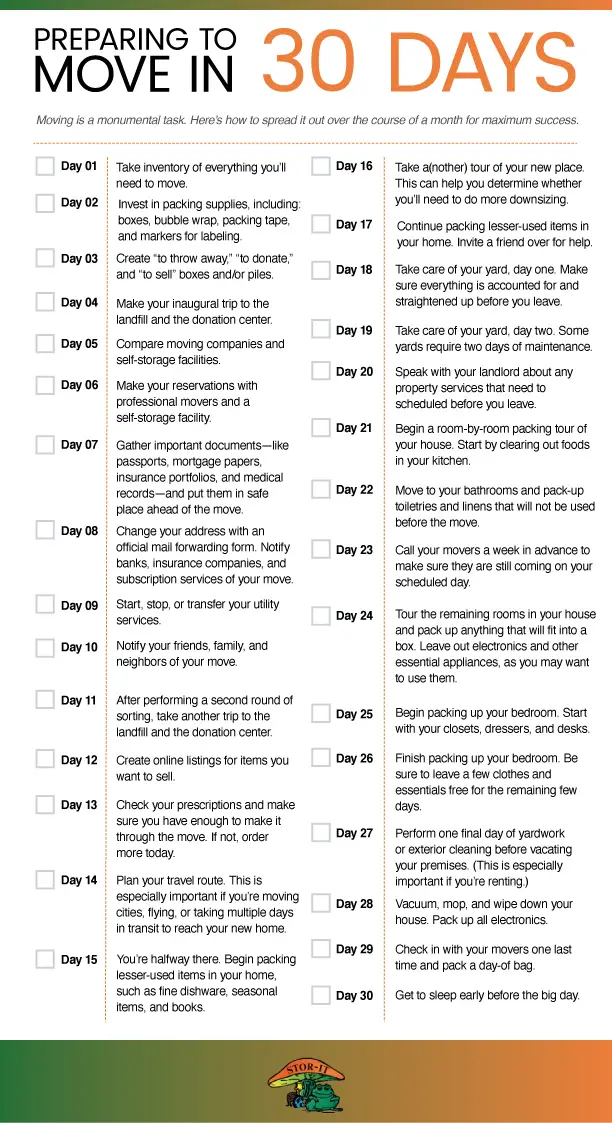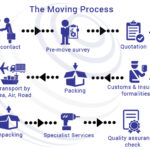The best thing to do before moving day is to go through all your stuff. Packing up can be a difficult task, but it is also a great time to organize your belongings. Use a moving guide to help you determine what to pack. Also, be sure to start your packing process early. The more time you give yourself for this process, the easier the whole process will be. And the best part is that moving isn’t very stressful once you’ve started.
Packing
One of the best things to do before moving day is to make an inventory of your belongings. This is especially important if you have high-value items such as electronics. If possible, document the make, serial number, and condition of each item. If possible, film yourself using the item in its working condition and note it on the inventory sheet.
Organizing your belongings is very important to make it easier to navigate the process. Start by packing your least-used rooms first, which will also make it easier to access frequently used items later on. It is also best to group similar items together to make the process of packing easier. This will also make it easier for you to label the boxes and will keep everything organized. Ensure that you do not overpack because this will lead to damage.
When it comes to moving day, you should try to leave enough time to complete all the packing. The sooner you start packing, the sooner you can start unpacking your belongings. You will also have more time to complete the task. It’s also helpful to have a checklist that includes basic tools you will need for opening boxes and packaged supplies.
You should start packing for moving day a few weeks before the actual move. If possible, try to move on a Friday, so you have a three-day weekend. This will allow you to make sure all of your utilities are set up and ready for your move. This will also give you time to make any necessary changes or transfers to your financial institution.
If you are moving by yourself, it is best to leave some items behind. For example, you might want to give away or sell items that are too difficult to move. Don’t forget to take extra precautions when packing breakable items, such as glassware. You may want to use newspaper to cover the glassware and plates.
Decluttering
Decluttering before moving day is an excellent way to reduce the stress of packing and moving. By decluttering before moving day, you can effectively prioritize your possessions and visualize what will fit in your new home. Here are some tips to help you get started: Keep a checklist. Decluttering before moving day is much easier when you declutter one room at a time, instead of trying to pack up multiple rooms at once.
Decluttering your house before moving day will not only save you time and energy, but will also save you money. It will also help you to sell items that have no use to you. You can even sell some of your unwanted items online. Another option is to hold a garage sale, where you sell items for a low price. It is also beneficial to notify friends and family about your move so they can be prepared.
Another way to declutter before moving day is to make a deadline. Setting a deadline will help you work faster and complete the task on time. Most adults don’t have the time to declutter on weekdays, so a weekend date is a good idea. You can also move excess items into storage to give your home a cleaner look.
Make a checklist of what needs to be moved. Make sure to include all of the essential items. This includes toilet paper, box cutter, hammer, nails, etc. You can also place a marker on this box to remind you where to find these items in your new home.
Creating a moving plan
It’s important to have a plan before moving day to reduce stress and make the move go as smoothly as possible. While there are many factors to consider, you should start by establishing a preliminary plan that will allow you to add details, such as a timeline and schedule, as necessary. Once you’ve created your plan, start thinking about the tasks that need to be completed in your current home before moving. This may include decluttering, packing, or even making small renovations.
Creating a moving checklist is another great way to make moving day go more smoothly. A checklist will help you organize items and avoid surprises by ensuring that everything is in order. You can start creating your checklist as early as two months before the big move. For example, a checklist may include finding free boxes, making sure all paperwork is completed, and backing up your computer files.
You should also create a budget so that you know how much you’ll need to pay for moving and storage. This will also help you calculate insurance costs. It’s also helpful to research various storage options and book a storage unit in advance. After that, you can begin creating a moving budget, including the costs for moving company fees, packing supplies, and security deposits. It’s also helpful to make a schedule to keep you on track.
You should also create a moving binder or Google Doc to keep track of all the moving tasks you need to accomplish. It’s wise to break down tasks into eight-week increments, beginning two months before moving day and ending two weeks after the move. You can create other sections in the binder to organize all the moving documents. These include receipts, contact information, and moving estimates.
Getting an early start on moving day
Getting an early start on moving day can help make the process run smoothly. It will also allow you to plan out tasks on a weekly basis, which can help reduce stress. In addition, if you have young children or pets, you can leave them at home. If you plan ahead, you can even leave them with your landlord to avoid any last-minute hassles.
One of the biggest responsibilities of moving is packing up your belongings. While this is crucial to a successful move, it can also be time-consuming. Before you begin, decide what items can be packed early and what can wait until the day of the move. You can also store some items at a family member or friend’s home until the move is completed.
Before packing up your belongings, label boxes with important documents. Prepare your moving kit with toilet paper, cleaning supplies, and snacks. You can begin packing bedrooms and bathrooms a few days before the big move. You can also break down beds a few days ahead of time. Getting an early start will ensure that you have less to do on moving day.
Getting an early start on moving day will also ensure that you have enough time to pack all of the essentials before the day of the move. This may include pajamas, extra clothes, and toiletries. It will also help if you have the support of two or three friends who will help you with the packing.
Packing your belongings is the most time-consuming part of moving. Therefore, it is best to begin packing as soon as you get confirmation of your move. You can even use a packing calendar to plan the necessary tasks.
Keeping a running list of moving-related tasks
As you prepare to move, you can create a moving list that outlines the steps you need to take to move. You should also label all boxes and storage containers with the room they are going to be placed in. Also, if possible, use up any perishable food before packing it up. You should also service your vehicle before driving across the country.
Moving can be a stressful experience, particularly if you have children or pets. Making a plan ahead of time is essential to minimizing stress and ensuring the safe and successful transition to your new home. Consider scheduling pick-ups and drop-offs at a convenient time. Keeping children and pets busy with iPads or chew toys is also helpful.
One week before moving day, you should go through your current home to make sure it’s safe. If you’re renting, make sure to check for damages, and contact your landlord if you have any questions or concerns. Once you’ve completed this, pack up the kitchenware and bathroom items. Make sure to wash the towels and bedding. Don’t forget to notify your HOA or neighbors about the move.
If you’re planning on moving during the workweek, try to take a day off. If you’re moving on a weekend, you’ll want to have time to pack up all your belongings. This way, you won’t have to worry about leaving important items behind.
You’ll need to keep a list of all the tasks you need to complete before the big move. For example, you’ll need to change your address for your utility bills and cancel your scheduled deliveries. Also, make sure you’ve updated your driver’s license and auto insurance. It’s also important to take care of your dry cleaning. If you have any medical prescriptions, contact them and let them know you’re moving.






